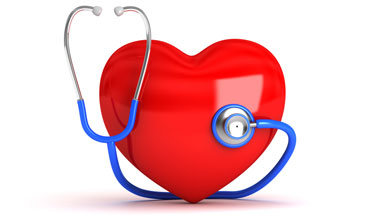February is All About Your Heart Health
 It can flutter with love, race in anxiety, or pound with excitement. Whatever it’s doing, your beating heart’s health must be protected so that you can keep living the crazy adventure that is your life. February is Heart Health Awareness Month, so take some time in the next few weeks to give your heart some TLC.
It can flutter with love, race in anxiety, or pound with excitement. Whatever it’s doing, your beating heart’s health must be protected so that you can keep living the crazy adventure that is your life. February is Heart Health Awareness Month, so take some time in the next few weeks to give your heart some TLC.
Your Heart at a Glance
Your heart is a muscular organ that continuously pumps blood to and from all areas of your body via the circulatory system—the arteries, veins, and capillaries. Your blood carries the oxygen and nutrients your cells need to work normally. It also carries carbon dioxide, a waste product, to your lungs to be passed out of your body and into the air.
Though weighing only 11 ounces on average, a healthy heart pumps 2,000 gallons of blood through 60,000 miles of blood vessels each day.
Five percent of blood supplies the heart, 15–20 percent goes to the brain and central nervous system, and 22 percent goes to the kidneys.
The “thump-thump” of a heartbeat is the sound made by the four valves of the heart closing.
Your heart health is vital to your entire body’s health. If disease or injury weakens your heart, your body’s organs might not receive enough blood to work normally, starting a cascade of negative side effects.
Heart Disease a Worldwide Epidemic
The scary part—some experts believe you have up to a 50 percent chance of dying from heart or artery disease. That’s one out of two people! Whatever the percentage, cardiovascular disease is most certainly one of the leading causes of death all over the globe. And it is happening to people younger and younger. Even scarier—it can be sneaky, so some people could already have cardiovascular disease and not know, because they haven’t shown any symptoms. And not only does the disease dramatically impact quality of life when it comes to physical health, it can cost a fortune to tackle the disease, leaving many families in poverty as well.
Fortunately, this is a nightmare that can be avoided. In this case, prevention truly is the best medicine. The answer, of course, lies in your day-to-day choices.
Small Changes Make a Big Difference
It is important that you work with your doctor to keep your health on track. But, generally, you know what to do. Your first order of business is to kick any bad habits such as tobacco use and overconsumption of alcohol, then take steps to improve an unhealthy diet and get more physical activity.
Sound like a tall order? The secret is to set manageable smaller goals. Want to eat more vegetables? Set a goal to just add veggies to your dinner tonight. Want to add thirty minutes of exercise, five times a week, but haven’t exercised in years? Set a goal to simply walk for 10 minutes today. Then tomorrow. Then the next day. Then walk for 15 minutes, and so on. If it isn’t overwhelming, you will stand a much better chance of lifelong success. Pick something to work on this month, and make the changes gradual. Just start somewhere.
Foods and supplements can definitely play a part in a heart healthy lifestyle. Check out USANA news and USANA Vitamins all month as the more information that will make you heart smart!

